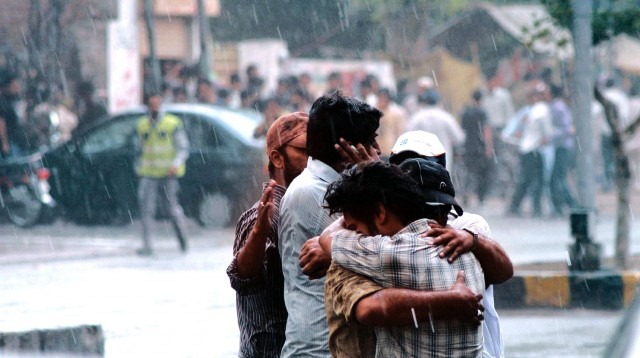
Image Courtesy:www.rabwah.net
Religious persecution has engulfed Pakistan. The orthodox clergy that took root in late 1970s has now brainwashed the current generation, promising heavenly rewards for following fanatical interpretations of Islam. Barring few Sunni sects, all religious groups suffer discrimination in Pakistan. Of these, the Ahmadis are amongst the most persecuted; the Pakistan Constitution and laws discriminate against Ahmadis and do not allow the community to live in peace and enjoy the fundamental rights as enshrined in the Constitution. The social, economic, and religious boycott has rendered members of the Ahmadiyya faith incapable of functioning as normal individuals in Pakistani society.
For instance, in Pichnand Village, Chakwal District, Punjab Province, 15 Ahmadi families consisting of 80 people are facing sustained harassment. According to media reports, new blasphemy cases are routinely being registered; in most such cases a certain Mohammad Saeed is the complainant and an advocate named Tariq Mehmood is the counsel.
The District and Sessions judge, in connivance with the orthodox clergy, has issued an order to take down the minarets and the dome of the sole place of worship for the Ahmadis in the Village. As per the law, under Section 298B 1(d), it is illegal and a punishable offence for an Ahmadi to call his place of worship a mosque. The text reads as follows: “refers to, or names, or calls his place of worship as “Masjid”; Shall be punished with imprisonment of either description for a term which may extend to three years and shall also be liable to fine.”
According to the monthly report on the persecution of Ahmadis released by Ahmadiyya Foreign Mission Office, on 4 May 2015, the bailiff of the district court razed the minarets and the mehrab (arch) of the local Ahmadiyya mosque. Policemen forced Ahmadis to vacate the worship place before razing the structures. The structure was built in 1962 before the promulgation of the anti-Ahmadi law that debars the community from raising a structure similar to a mosque. Before the expiry of the 10-day period to challenge the order of the court, the bailiffs were sent by the court to demolish the minarets.
According to media reports, the atmosphere at the Village is extremely tense. All Ahmadis in the Village are living in fear of their lives. No one is prepared to listen to them, help them, or protect them. On the contrary, the Police and the Judiciary support, encourage, and facilitate vandalism against Ahmadis. As per the Ahmadiyya Foreign Mission Office report, since the promulgation of anti-Ahmadi laws in Pakistan, 27 Ahmadiyya mosques have been demolished, 31 sealed, 19 set on fire or damaged, 16 forcibly occupied, and the construction of 52 barred.
Several Ahmadi families have moved out of Pakistan post 1974, when the government declared the community as non-Muslim. Many Ahmadis have sought asylum in secular states to escape persecution and threat. The Ahmadiyya community has become particularly vulnerable since 1984, when Pakistan passed laws forbidding them from saying or doing anything associated with Islam. The Khatam-e-Nabuwat movement, as well as the judgment in Zaheer-ud-din v. The State 1993 SCMR 1718, whereby the Ahmadis were deemed non-Muslim, poisoned the masses against the minority group, so much so that it is now considered a great service to Islam to murder, loot, and plunder an Ahmadi. This has opened a pandora’s box of religious hatred, spreading to all parts of the country, engulfing whatever little was left in terms of freedom of religion in Pakistan. The 1993 judgment is celebrated as the victory of Islam and the day is marked as Khatam-e-Nabuwat day.
Philanthropists amongst the faith are not allowed to pay zakat, a religious obligation of compulsory charity, or to offer sacrifice, or to even use the word Muhammad (PBUH) as their name. Ahmadis are also not allowed to recite the Muslim salutation as a greeting. Many Ahmadi businessmen are forced to pay extortion money, while some have had to suffer arson attacks and vandalism of their property. Vandals, who have taken up the mission to punish the peace-loving community for professing their faith, routinely ransack graveyards, shops, mosques, homes, and schools operated by Ahmadis. No one is spared the wrath of the fascist zealots who believe that the Ahmadis are wajib-ul qatal (liable to be killed). The intolerance of the society has seeped into the State. The Army too has certain unspoken rules, whereby no Ahmadi can be promoted beyond the rank of Colonel.
Following the Lahore mosque attack, where 94 people were killed on 28 May 2010, the persecution has intensified and the Ahmadis feel utterly unsafe in Pakistan. No rural or urban area is safe for them and not a single day goes by when Ahmadis are not targeted.
The Asian Human Rights Commission urges the State to take stern action against the culprits who are harassing the community. Freedom of religion, as guaranteed under Article 20 of the Constitution, and Article 18 of the ICCPR, to which Pakistan is a signatory, makes it obligatory for the State to ensure religious freedom and that no one is persecuted for professing his faith. The State and the Judiciary must ensure that the perpetrators of terror are prosecuted and that the community is allowed to profess its religion without fear.